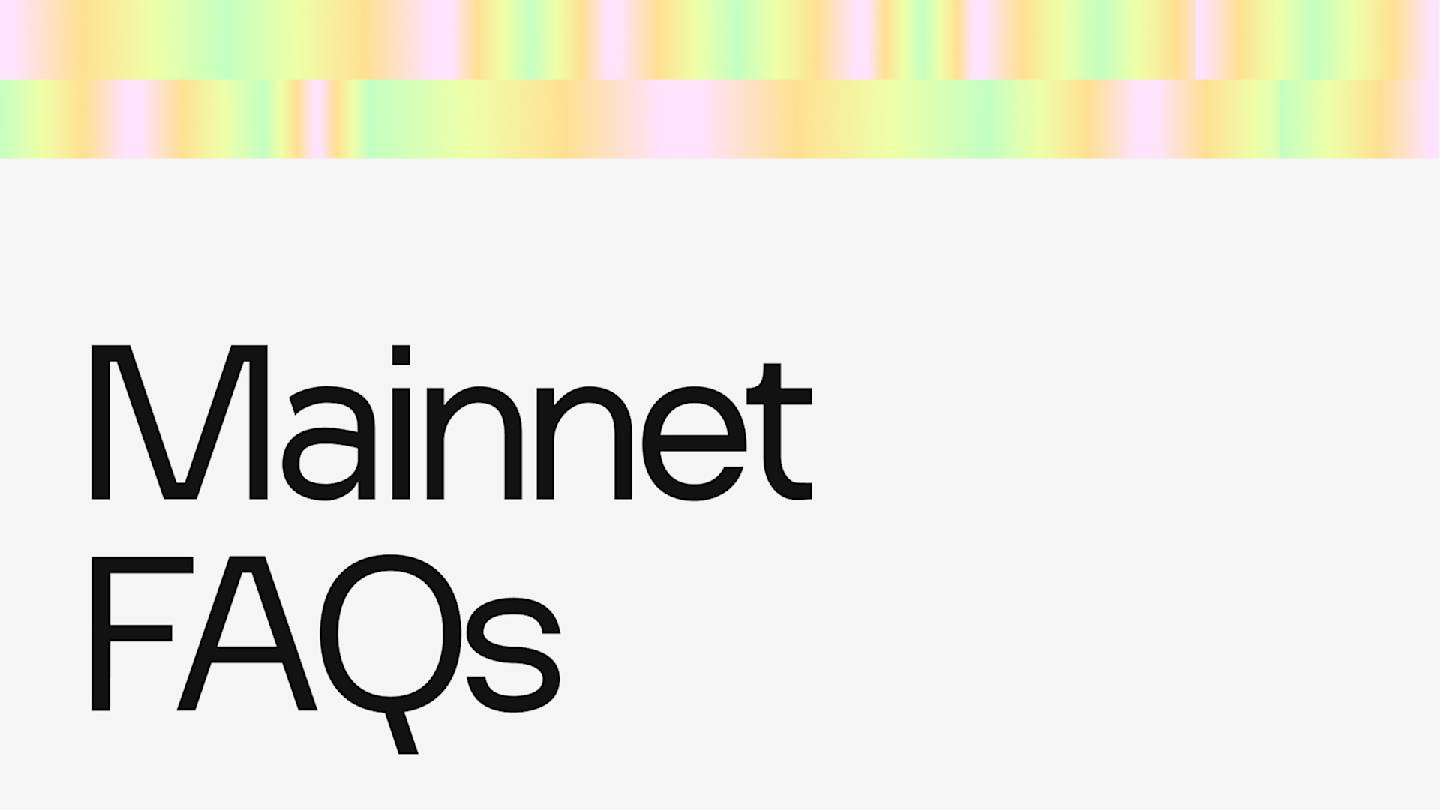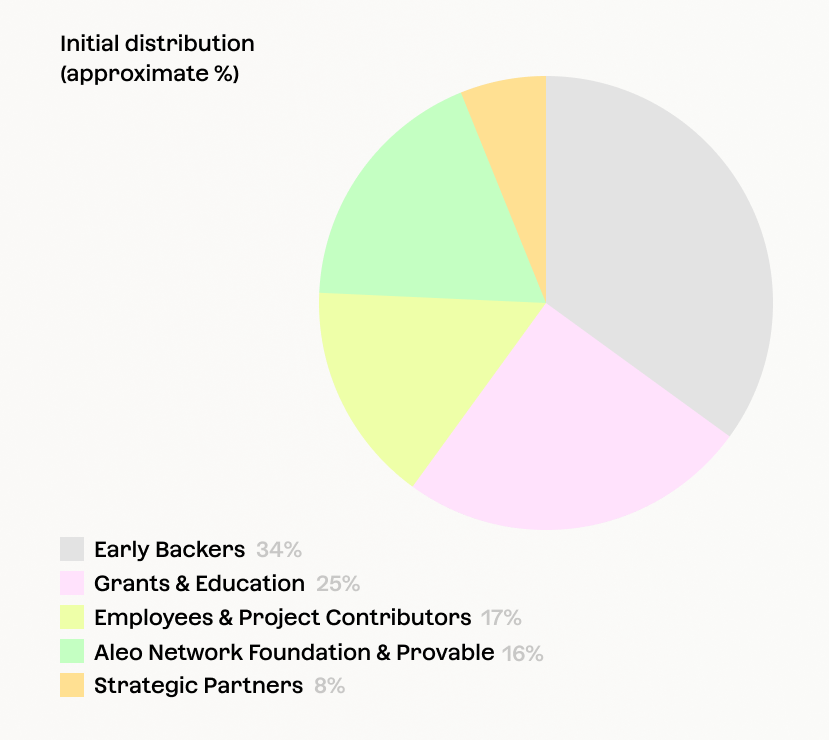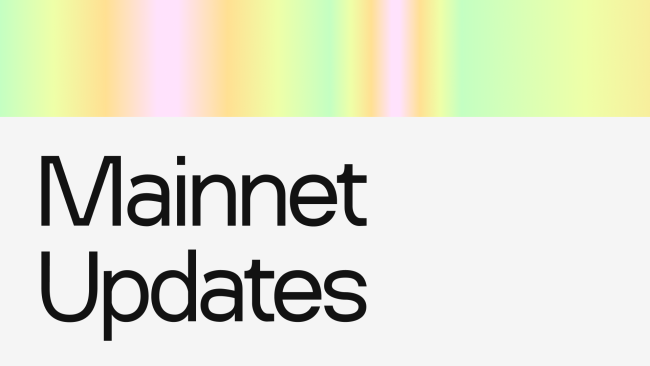Aleo Mainnet: Everything you need to know

With the launch of mainnet, the cryptographic innovations described in the ZeXe research paper are finally a reality. But now that the Aleo Network is officially live, you may be wondering how it all works — what’s changed and what has stayed the same across the multiple iterations of the Aleo Network.
This article answers a few common questions about Aleo, including upcoming features, how to become a validator, and how to claim Aleo tokens earned through incentives programs.
Aleo Mainnet
What can I do on mainnet?
The possibilities are endless. Zero-knowledge dApps could be used to improve countless industries, from building more secure medical records to verifiable machine learning.
Where can I see projects built on Aleo?
You can check out the Aleo Ecosystem to explore projects built on Aleo, as well as join the Coinbase Quest (coming soon) to get acquainted with a few of our ecosystem partners.
For more technical foundations and advanced applications on Aleo, you can find a comprehensive list of projects in this compilation.
Are there any DeFi protocols?
Here is a list of several ZeFi (zero-knowledge decentralized finance) projects on the Aleo Network.
Does Aleo have an official wallet?
Aleo does not have an official wallet, but you can generate a new Aleo address and view your record using the Aleo SDK.
Alternatively, you can use wallets developed by Aleo grantees, including Leo Wallet, Puzzle, and Avail.
Does Aleo have a mobile wallet?
Aleo does not have an official mobile wallet. However, Leo Wallet and Puzzle offer iOS and Android apps.
How can I bridge to Aleo?
To explore how to bridge to Aleo, look at our curated list of bridges. Interested in building a bridge? Get funding and support by applying for a grant.
The Foundation will be sharing more information about our official bridge partners in the coming weeks. Bridges play an important role in our ecosystem and you can check out some of their best practices here.
The Aleo Network
What is the Aleo Network Foundation?
The Aleo Network Foundation is a Delaware incorporated non-profit 501c4 organization created to guide and support the Aleo Network, focusing on open-source governance, developer engagement, and promoting zero-knowledge cryptography applications. It does not own the Aleo Network; its purpose is to support, govern, and guide the community.
What is the Aleo Network?
The Aleo Network is a decentralized and leading developer platform for building secure, scalable, and cost-effective decentralized applications. Using zero-knowledge cryptography, Aleo moves smart contract execution off-chain to enable new use cases for applications like identity, finance, and gaming, scaling to thousands of transactions per second. Built on a decentralized, permissionless blockchain, Aleo brings the flexibility of Ethereum with the potential for a more scalable architecture that's designed from the ground up for privacy.
Has the Aleo Network codebase been audited?
The Aleo Foundation has dedicated a lot of resources and attention to ensuring mainnet is secure and reliable. The two core repositories of SnarkOS and SnarkVM have been exhaustively audited by 3 independent partners, as well as a community Bug Bounty and a smaller audit contest for ARC-0041.
Are there transaction fees on the Aleo Network?
Aleo transaction fees are a minimum of 0.005 Aleo Tokens, and can go up to 32 credits for substantially complex operations. Most normal usage transactions average between 3-10 millicredits.
The minimum fee is tied to the size of the Aleo program you want to deploy. The Aleo SDK has an “estimate fee” feature that you can use.
How is Consensus reached on the Aleo Network?
AleoBFT is a custom consensus algorithm designed specifically for Aleo. It's based on the Bullshark and Narwhal protocols.
A key feature of AleoBFT is its Coinbase puzzle, which draws from the Proof-of-Succinct Work model. Provers solve this puzzle for each block and receive a portion of the block reward in return. The Coinbase puzzle is designed to mimic the process of creating a SNARK proof for a network transaction.
What is required to become a validator on mainnet?
Aleo validators are network service providers who maintain the network's security. They use AleoBFT, a consensus mechanism based on Proof of Stake. This system incorporates advanced consensus research, specifically the Bullshark protocol. It also uses a directed acyclic graph (DAG) memory pool, similar to the Narwhal design.
These are the requirements to validating on Aleo:
Minimum 10M Aleo Tokens
Use snarkOS software to run a validator node
You can find the hardware requirements to set up a node here.
Where can I stake tokens?
The Aleo Foundation does not have an official staking product, nor do we review, vet, or endorse any staking service providers or products. If you would like to contribute to the security of the Aleo Network by staking Aleo tokens, please refer to third-party services in the Aleo ecosystem that offer these types of products and services.
Governance
How will the Aleo Network be governed?
The Aleo Foundation was created as a stepping stone towards full decentralized control over the Aleo Network. Our role is to steward decision making and developments on Aleo, while progressively empowering our users to take control.
Currently, Aleo Network Foundation team members, validators, ambassadors, and ecosystem partners may participate in decentralized governance and vote on upgrades and changes to the protocol. You can monitor proposals (ARCs) and voting using our official governance platform.
How will Aleo Ambassadors be governed?
The post-mainnet structure for the Ambassador program will retain the three primary tiers: Apprentice, Voyager, and Maestro. Participants must continue to submit content and accumulate Aleo Points to maintain program eligibility. It is important to note that Aleo Points hold no intrinsic value.
Maestro Checkers will continue to evaluate ambassador contributions. Governors will oversee and promote decentralized voting for modifications to Aleo programs, including the Ambassador and Grants initiatives, as well as network updates.
The key modification lies in the nature of expected content. Previously, ambassadors were encouraged to produce blog posts, create animated graphics, and translate various materials. Moving forward, all monthly submissions must directly relate to and interact with mainnet.
You can read more about the future of the Ambassador program here.
How will new features be implemented on the Aleo Network?
The Aleo governance platform allows community officials, ambassadors and foundation members to make proposals on new deployments in the Aleo blockchain. Governors can submit ARCs (Aleo Request for Comment), which are protocol-level, network-level, and application-level standards that outline future deployments on the Aleo ecosystem’s overarching systems.
For now, only Aleo Foundation employees, Governors (who are elected by the community), and Aleo Grantees can propose ARCs. Any community member can visit the governance platform to check on ARCs, participate in discussion, and have their voice heard through Governors. In the future, we intend to progressively open up opportunities for more community members to participate in governing the network.
The Aleo Token
What is happening with Aleo Credits?
Aleo Credits are just another name for Aleo Tokens - the idea here is that an Aleo Credit (or Token) is used to pay for computational services on the Aleo Network, just as you might use store credit to buy goods or services from the relevant store. At the same time, “token” is a more common term in the space and so we are using it to avoid introducing new terms where they may not be necessary.
What is the purpose of the Aleo Token?
Aleo Tokens allow users to access the Aleo Network's computational resources and blockspace. When users want to make transactions or use the network, the protocol rewards provers and validators with Aleo Tokens for their role in securing the network.
Users can stake their Aleo Tokens with validators. These validators then produce blocks and help secure the network. In return, stakers receive a proportional share of the network rewards.
Aleo Token holders will have a say in how the network is run. They'll be able to vote on proposed improvements and changes to the network's core mechanisms and features.
For more information on the role of Validators, Provers and Stakers in the Aleo Network, check out the network infrastructure FAQ.
What can I do with Aleo Tokens?
As an Aleo Token holder, you have several options for participating in the network:
For users
Use the network. You can transact with Aleo Tokens and try out the Aleo Ecosystem projects.
Stake. You can stake your Tokens with validators to earn a share of the network rewards, without needing to run any technical infrastructure yourself.
Participate in governance. You'll be able to vote on proposed changes and improvements to the network in the future (as outlined in the “How will the Aleo Network be governed?” section above), helping to shape new deployments to the network.
For those interested in running network infrastructure
Operate a validator. You can use your tokens to run a validator node, producing blocks and securing the network. This role earns rewards from the protocol.
Become a prover. You can provide computational power to the network as a prover, also earning rewards for your contribution.
How are Aleo Tokens allocated and distributed?
You can read more about incentives token distribution here.
At launch, there will be 1.5 billion Aleo Tokens. After launch, the consensus algorithm will auto-generate Credits to reward puzzle-solving provers and stakers.
Similar to Bitcoin, the Aleo Network is secured by economic incentives. The protocol issues new Aleo Credits algorithmically to participants who follow the protocol honestly. Validators earn Aleo Credits for validating transactions and creating blocks, and provers earn Credits by contributing their computational resources to generating proofs which help secure and facilitate transactions.
The initial emission of Aleo Tokens will be approximately allocated as follows:

When will the rewards for participants in Aleo testnets and deploy incentives be distributed?
Warning: Make sure to always verify that the website's URL belongs to the “Aleo.org” domain before submitting any personal information. Phishing scams can lead to token theft, so it's crucial to double check the website address, understand the associated risks, and confirm you're not on a fraudulent site.
The Aleo incentives token distribution allocation recognizes participants who have been essential in building the Aleo network and the community that supports it.
To be eligible for incentive distribution, you must have participated in one of the following programs:
Setup Ceremony
Aleo Testnet2
Aleo Testnet3
Developer Incentives Program
Deploy Incentives Program
ZPrize
zkML
Aleo Ambassadors Program
Enigma
Is the KYC process mandatory to claim tokens?
Yes. You must complete the KYC (Know Your Customer) process via our institutional partner to claim.
If your KYC verification is still pending after 48 hours, contact us on the KYC questions channel in the Aleo Discord.
Is there a deadline for claiming my Aleo Tokens?
There may be deadlines for claiming your tokens depending on the specific incentive program you participated in. These deadlines are critical as they ensure that all participants have a fair chance to claim their rewards within the stipulated time.
Steps to Ensure You Don’t Miss the Deadline:
Check the Aleo Website: Regularly visit the official Aleo website where all deadlines and important dates are published.
Monitor Official Communications: Keep an eye on emails, newsletters, and announcements from Aleo. These communications often contain reminders and updates regarding deadlines.
Claim Promptly: To avoid any potential issues or the risk of missing the deadline, it’s strongly recommended that you claim your tokens as soon as possible after you become eligible.
If you fail to claim your Aleo Tokens before the deadline, you may forfeit your entitlement to those tokens, meaning they could be reallocated or become unavailable for future claiming.
How do Aleo Tokens lock, and what is the cliff?
All Aleo Token claims, by Aleo Foundation employees, associates, incentives program participants and other contributors, no matter their geographical location or country of provenance, will have a 1-year lock-up period where the trading of Aleo Tokens will be restricted. Foundation employees will be subject to more restrictive lock-up provisions to ensure fairness.
You can read more about the incentives program token distribution here.
What is the schedule for Aleo Ambassadors?
Ambassadors will be subject to the same lock-up period as other incentives program participants. Read more about updates to the Ambassador program.
I have issues claiming my Aleo Tokens. What should I do? Who should I contact?
If you have any issues with claiming your Aleo Tokens, you can contact the Aleo Team on Discord in the KYC Questions channel. All questions about KYC that are not in this channel will not be answered.
When is $ALEO being listed on Exchanges?
The Foundation is focused on encouraging an ecosystem of applications that make the internet better and safer. The exchanges can be an important part of this ecosystem as more and more developers need tokens to access the network’s utility. As this happens, and as the network further decentralizes, we expect that Aleo Tokens will be able to be exchanged on both decentralized finance (DeFi) platforms and centralized exchanges.
What is the Aleo Token price?
The Aleo Token price is not determined by the Aleo Foundation.
Will Aleo have an airdrop?
There will not be an official Aleo airdrop, but we will clearly and transparently announce any and all opportunities for participants to earn Aleo Tokens, as we have done in the past.
The Aleo Token distribution is designed to honor participants who earned rewards in the incentives programs, as well as Aleo Ambassadors, who are the backbone of our community.
The Aleo Team will announce any future token distributions on our official social accounts. Please exercise caution with any and all distribution announcements that haven’t been corroborated by foundation members on our Discord or official X account.


